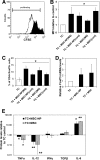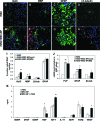Characterization of autologous mesenchymal stem cell-derived neural progenitors as a feasible source of stem cells for central nervous system applications in multiple sclerosis
- PMID: 23197858
- PMCID: PMC3659719
- DOI: 10.5966/sctm.2012-0015
Characterization of autologous mesenchymal stem cell-derived neural progenitors as a feasible source of stem cells for central nervous system applications in multiple sclerosis
Abstract
Bone marrow mesenchymal stem cell-derived neural progenitors (MSC-NPs) are a potential therapeutic source of cells that have been shown to be efficacious in a preclinical model of multiple sclerosis (MS). To examine the feasibility of using MSC-NPs as an autologous source of cells to promote central nervous system (CNS) repair in MS, this study characterized human MSC-NPs from a panel of both MS and non-MS donors. Expanded MSCs showed similar characteristics in terms of growth and cell surface phenotype, regardless of the donor disease status. MSC-NPs derived from all MSCs showed a consistent pattern of gene expression changes that correlated with neural commitment and increased homogeneity. Furthermore, the reduced expression of mesodermal markers and reduced capacity for adipogenic or osteogenic differentiation in MSC-NPs compared with MSCs suggested that MSC-NPs have reduced potential of unwanted mesodermal differentiation upon CNS transplantation. The immunoregulatory function of MSC-NPs was similar to that of MSCs in their ability to suppress T-cell proliferation and to promote expansion of FoxP3-positive T regulatory cells in vitro. In addition, MSC-NPs promoted oligodendroglial differentiation from brain-derived neural stem cells that correlated with the secretion of bioactive factors. Our results provide a set of identity characteristics for autologous MSC-NPs and suggest that the in vitro immunoregulatory and trophic properties of these cells may have therapeutic value in the treatment of MS.
Figures







Similar articles
-
Phase I Trial of Intrathecal Mesenchymal Stem Cell-derived Neural Progenitors in Progressive Multiple Sclerosis.EBioMedicine. 2018 Mar;29:23-30. doi: 10.1016/j.ebiom.2018.02.002. Epub 2018 Feb 3. EBioMedicine. 2018. PMID: 29449193 Free PMC article. Clinical Trial.
-
Mesenchymal stem cell-neural progenitors are enriched in cell signaling molecules implicated in their therapeutic effect in multiple sclerosis.PLoS One. 2023 Aug 11;18(8):e0290069. doi: 10.1371/journal.pone.0290069. eCollection 2023. PLoS One. 2023. PMID: 37566599 Free PMC article.
-
Clinical and pathological effects of intrathecal injection of mesenchymal stem cell-derived neural progenitors in an experimental model of multiple sclerosis.J Neurol Sci. 2012 Feb 15;313(1-2):167-77. doi: 10.1016/j.jns.2011.08.036. Epub 2011 Oct 1. J Neurol Sci. 2012. PMID: 21962795
-
Mesenchymal stem cell transplantation in multiple sclerosis.J Neurol Sci. 2013 Oct 15;333(1-2):43-9. doi: 10.1016/j.jns.2012.12.009. Epub 2013 Jan 4. J Neurol Sci. 2013. PMID: 23294498 Free PMC article. Review.
-
Mesenchymal Stem Cells in Multiple Sclerosis: Recent Evidence from Pre-Clinical to Clinical Studies.Int J Mol Sci. 2020 Nov 17;21(22):8662. doi: 10.3390/ijms21228662. Int J Mol Sci. 2020. PMID: 33212873 Free PMC article. Review.
Cited by
-
The Role of Mesenchymal Stem Cells in Modulating Adaptive Immune Responses in Multiple Sclerosis.Cells. 2024 Sep 16;13(18):1556. doi: 10.3390/cells13181556. Cells. 2024. PMID: 39329740 Free PMC article. Review.
-
Mesenchymal Stem Cell Therapy Using Human Umbilical Cord in a Rat Model of Autoimmune-Induced Premature Ovarian Failure.Stem Cells Int. 2020 Jul 4;2020:3249495. doi: 10.1155/2020/3249495. eCollection 2020. Stem Cells Int. 2020. PMID: 32714395 Free PMC article.
-
Mesenchymal stem cell-derived neural progenitors in progressive MS: Two-year follow-up of a phase I study.Neurol Neuroimmunol Neuroinflamm. 2020 Dec 4;8(1):e928. doi: 10.1212/NXI.0000000000000928. Print 2021 Jan. Neurol Neuroimmunol Neuroinflamm. 2020. PMID: 33277427 Free PMC article. Clinical Trial.
-
Mesenchymal stromal cells for the treatment of Alzheimer's disease: Strategies and limitations.Front Mol Neurosci. 2022 Oct 6;15:1011225. doi: 10.3389/fnmol.2022.1011225. eCollection 2022. Front Mol Neurosci. 2022. PMID: 36277497 Free PMC article. Review.
-
Long non-coding RNA: The functional regulator of mesenchymal stem cells.World J Stem Cells. 2019 Mar 26;11(3):167-179. doi: 10.4252/wjsc.v11.i3.167. World J Stem Cells. 2019. PMID: 30949295 Free PMC article. Review.
References
-
- Sadiq S. Multiple sclerosis. In: Rowland L, editor. Merritt's Neurology. 11th ed. Philadelphia: Lippincott, Williams, and Wilkins; 2005. pp. 941–963.
-
- Singer NG, Caplan AI. Mesenchymal stem cells: Mechanisms of inflammation. Annu Rev Pathol. 2011;6:457–478. - PubMed
-
- Gordon D, Pavlovska G, Uney JB, et al. Human mesenchymal stem cells infiltrate the spinal cord, reduce demyelination, and localize to white matter lesions in experimental autoimmune encephalomyelitis. J Neuropathol Exp Neurol. 2010;69:1087–1095. - PubMed
-
- Kassis I, Grigoriadis N, Gowda-Kurkalli B, et al. Neuroprotection and immunomodulation with mesenchymal stem cells in chronic experimental autoimmune encephalomyelitis. Arch Neurol. 2008;65:753–761. - PubMed
Publication types
MeSH terms
Substances
LinkOut - more resources
Full Text Sources
Other Literature Sources
Medical

